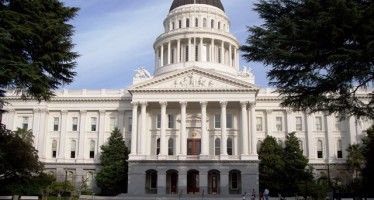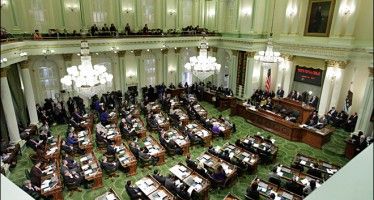13 CA ZIP codes have lead contamination as bad as Flint
 The water contamination scandal in Flint, Michigan, triggered national outrage and prompted Congress last month to pass a bill rushing $120 million in federal aid to the city.
The water contamination scandal in Flint, Michigan, triggered national outrage and prompted Congress last month to pass a bill rushing $120 million in federal aid to the city.
The local regulators who knew about the severity of lead contamination and protected themselves but not the community are facing criminal charges. That’s because a high presence of lead in the blood is associated with low IQs and cognitive problems and can be devastating for infants and children.
Now a massive study by Reuters — based on federal health data from 21 states and broken down by ZIP code — points to at least 13 areas in California with problems as bad or worse than what is now seen in Flint, where 5 percent of tested children have elevated levels of lead in their blood. The national norm is 2.5 percent.
Oakland neighborhood has worst problem
The problem appears worst in the Oakland community of Fruitvale (ZIP code 94601), where 7.57 percent of children had high levels of lead.
Next is the Seaside-Sand City area (ZIP 93955) east of Monterey, where the rate was 7.44 percent.
Nine ZIP codes were in the Fresno area, which has already had a lead scare this year, as CalWatchdog reported in August. The results were worst in Selma, 15 miles southeast of Fresno (ZIP 93662), where 6.62 percent of children had high levels of lead in the their blood.
The last two California communities with lead contamination problems worse than Flint were in Los Angeles County.
In south-central Los Angeles (ZIP 90011) in an area east of the 110 Freeway and south of the 10 Freeway, the rate of children with elevated lead in their blood was 5.28 percent.
In the Rosemead-South San Gabriel area (ZIP 91770), the rate was 5.17 percent.
The federal health statistics are mostly based on blood samples from at least 500 children in each ZIP code for five- or 10-year increments ending in 2015. California did much better that most of the 20 other states whose data was studied. In total, 278 ZIP codes had much worse lead problems than Flint, with the biggest concentration in industrial centers in the Midwest and in areas with a history of heavy mining.
Flint fits that profile. But its problems were at the least exacerbated by city officials’ 2014 decision to stop bringing in water from the Detroit system in favor of a switch to cheaper local sources, including the heavily polluted Flint River.
When lead contamination problems are found in the United States, the problem is usually exposure to lead-based paint, especially in older housing, and from old water pipes.
Official misconduct in Fresno endangered residents
Such pipes caused the lead scare in Fresno earlier this year, but official misconduct was part of the problem. In January, after many reports of discolored water, Fresno officials began reviewing how the city water agency dealt with complaints. They discovered that a water official named Robert Moorhead had failed to pass along as many as 1,400 complaints from 2005 to 2011 about problems with water from the treatment plant in northeast Fresno that he managed. Moorhead, who was fired for undisclosed reasons in 2011, has denied wrongdoing.
But a subsequent city probe found evidence of excessive lead in pipes in 51 of the first 280 homes it inspected, or 18 percent. Eventually, city officials warned residents of the 93710, 93720 and 93730 ZIP codes that they could have pipe problems and thus potential exposure to excessive lead.
But the Reuters study should offer some relief to residents of those ZIP codes. None were found to have Flint-level contamination rates.
Chris Reed
Chris Reed is a regular contributor to Cal Watchdog. Reed is an editorial writer for U-T San Diego. Before joining the U-T in July 2005, he was the opinion-page columns editor and wrote the featured weekly Unspin column for The Orange County Register. Reed was on the national board of the Association of Opinion Page Editors from 2003-2005. From 2000 to 2005, Reed made more than 100 appearances as a featured news analyst on Los Angeles-area National Public Radio affiliate KPCC-FM. From 1990 to 1998, Reed was an editor, metro columnist and film critic at the Inland Valley Daily Bulletin in Ontario. Reed has a political science degree from the University of Hawaii (Hilo campus), where he edited the student newspaper, the Vulcan News, his senior year. He is on Twitter: @chrisreed99.
Related Articles
Assemblyman denounces ‘bullying’ by committee chair
Assemblyman Matthew Harper, R-Huntington Beach, has accused Assemblyman Roger Hernández, D-West Covina, the chairman of the Assembly Labor and Employment
VIDEO: Scott Walker on right-to-work and Obama criticism
CalWatchdog.com Editor-in-Chief Brian Calle recently interviewed Wisconsin Gov. Scott Walker. This is Part 1, on right-to-work and Obama’s criticism. Walker is
Sacramento mired in budget bickering
Having failed to deliver during a special legislative session Gov. Jerry Brown called last year, Sacramento Democrats and Republicans squared off




